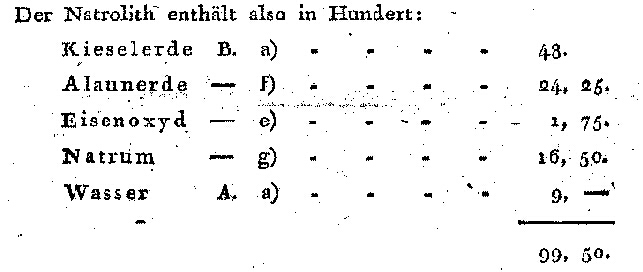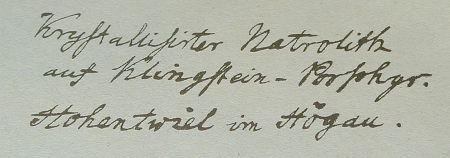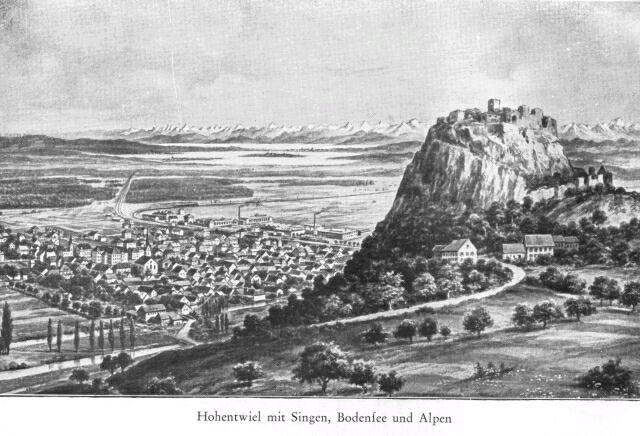
![[Image]](Hohentwiel_2-Dateien/pict21.jpg)
Klaproth, Martin Heinrich
(1743-1817)
![[Image]](Hohentwiel_2-Dateien/pict18.jpg)


as shown in the Klaproth-Case of the Museum für Naturkunde Berlin:
Krystallisirter Natrolith auf Klingstein-Porphyr
Hohentwiel im Högau
| Home | Occurrences | Germany | Hegau | Hohentwiel |
| Klaproth | Hohentwiel | Ekkehard | Natrolith | LINKS |
Zeolites in Germany:
Natrolith - Natrolite 200 +Years !
200 years ago in 1803, the German pioneer in Analytical Chemistry and Pharmacy, Martin Heinrich Klaproth, published his analysis of an unknown mineral : " schmutzig ockergelb, das sich bald dem Isabellgelb, bald dem Gelblichbraun nähert, mit weißlichen Streifen konzentrisch gezeichnet; derb, nähmlich Gangtrümmer bildend im Klingstein-Porphyr, auf den Ablösungen Spuren einer nierförmigen Bildung, mit dünnen, kurzen, nadel- und haarförmigen Krystallen bedeckt; ... Das eigentümliche Gewicht ist = 2,200."
He used 50 gran ( = 6.48 g) for his detailed gravimetric analysis. Because of the high sodium content, he named the new "Fossil" Natrolith.
| See some Biographies of Klaproth | |||||
| http://www.chemsoc.org/networks/enc/fecs/Klaproth.htm | http://www.mdr.de/geschichte/personen/133433.html | ||||
| Also in 1803 Bergrath Selb of Wolfach wrote a supplement refering to Kaproths publication, giving some details to the occurence at the northern slope of Hohentwiel und credit to the new name given by Klaproth. Selb used prior to Klaproth the name Högenit. Also the other Hegau Volcanoes are mentioned. | |||||
| Both Papers are online in : Der
Gesellschaft Naturforschender Freunde zu Berlin, Neue Schriften Klaproth, M.H. (1803): Chemische Untersuchung des Natroliths. - Ges. Naturforschender Freunde zu Berlin, Neue Schriften, 4, S. 243 - 248 Selb, J.C. (1803): Über den Höganit nunmehr Natrolith genannt, nebst einigen geognostischen Bemerkungen über die Gegend im Högau. - Ges. Naturforschender Freunde zu Berlin, Neue Schriften, 4, S. 395-407 |
|||||
|
The type locality for natrolite is interesting for several reasons: The Hohentwiel is a well-known landmark; it is one of the characteristic Hegau volcanoes; it is associated with a long and interesting history dating back to its initial fortification in the 10th century. The natrolite occurrence is at the northern slope of the mountain. An exact description was given by Karl Caesar von Leonhard in 1809 as follows: |
|||||
 |
Natrolith Occurence as described by: Leonhard, K.C. Ritter von Leonhard (1805-09) - Handbuch der Topographischen Mineralogie, 3 Volumes :
Left : Reproduced photograph from about 1925. The Natrolite location is behind the buildings of the "Maierhof". (From: Gagg, Gebhard; Der Hohentwiel im Krieg und Frieden, 11. Auflage o.J, Verl. Josef Ott, Singen) |
||||
|
See also the geotouristic pages (including maps) of the LANDESAMT FÜR GEOLOGIE, ROHSTOFFE UND BERGBAU BADEN-WÜRTTEMBERG "Baden-Wüttemberg State Bureau for Geology, Recources and Mining" Burggraben Hohentwiel - Geotourismus Detail Hohentwiel mit Ruine -Geotourismus Detail Vulkanpfad Hohentwiel - Geotourismus Detail More geoptopes of the Baden Württemberg State (in German): http://www.lgrb.uni-freiburg.de/lgrb/Service/geotourismus_uebersicht/geotourismus/gto_uebersicht
|
|||||
|
The natrolite locality is also mentioned in German literature of the 19th century which is very unusual for a mineral. In Ekkehard, by Victor von Scheffel (1855), the following text describes the place and the mineral: Achtes Kapitel Audifax Ihr sollt mir's nicht umsonst geben, sagte er, ich will Euch was Schönes zeigen. Es müssen viele Schätze im Berg sein, ich weiß einen, der ist aber nicht der rechte. Ich möcht' den rechten finden. Ekkehard ward aufmerksam: Zeig mir, was du weißt! Audifax deutete bergabwärts. Da ging Ekkehard mit ihm zum Burghof hinaus und die Stufen des Burgwegs hinunter; auf des Berges Rückseite, wo der Blick zu des hohen Stoffeln tannigem Haupt hinüberstreift und zum hohen Höwen, bog Audifax vom Weg ab, sie gingen durchs Gebüsch, kahl, in verwittertem Grau strebte die Felswand vor ihnen zur Himmelsbläue empor. Audifax bog einen Strauch zurück und riß das Moos auf; in dem grauen Klingstein, der des Berges Kern ist, ward eine gelbe Ader sichtbar; in eines Fingers Breite zog sie durchs Gestein. – Audifax löste ein Stück ab, versteinten Tropfen gleich saß der eingesprengte Stoff in der Spalte, strahlend, rundlich, goldgelb, und in weißrötlicher Druse hafteten Opalkristalle. Prüfend sah Ekkehard auf das abgelöste Stück. Der Stein war ihm fremd. Edelstein war's nicht; die gelehrten Männer haben ihn später Natrolith getauft. Seht Ihr, daß ich etwas weiß! sprach Audifax. Was soll ich damit? fragte Ekkehard. Das wißt Ihr besser als ich, Ihr könnt's schleifen lassen und Eure großen Bücher damit verzieren – gebt Ihr mir jetzt den Zauber? |
|||||
|
The Ekkehard is complete online at the Gutenberg Project: http://www.gutenberg2000.de/scheffel/ekkehard/ekkeh082.htm . |
|||||
| Natrolith - Natrolite from Hohentwiel | |||||
|
|
|||||
| Natrolite, polished, ca. 3x6 cm from Hohentwiel | |||||
|
Natrolite from the Hohentwiel cannot be better described in words than those used by Klaproth. The natrolite is most remarkable because of its color-zoned radiating structure. Color varies from white through various shades of yellow to orange brown. It mostly occurs as massive veins within phonolite, sometimes associated with calcite and hyalite (the latter mentioned by 'Ekkehard'). Cavities also occur, lined with well-formed though mostly small crystals. Polished plates of the natrolite have been used to decorate the 'Stuttgarter Schloss' (i.e. Stuttgart Palace). The Hohentwiel has been a nature reserve since 1941 and is of great botanical interest. Access to the steep slopes and natrolite locality is limited, with collecting being almost impossible. However, specimens of natrolite from Hohentwiel are present in most of the older museum collections of the world. |
|||||
|
|||||
|
|
|||||
| Historic Natrolite Specimen
(ca. 2,5 cm ) with crystals Natrolith in Porphyrschiefer Hohentwiel in Schwaben |
|||||
|
Some other pics of Natrolite from Hohentwiel found in THE WEB: http://www.museum.hu-berlin.de/min/mitarbeiter/mitarb/ralf/hmin05.html Informations about Natrolite in THE WEB: http://www.mindat.org/min-2947.html |
|
A Visitors Guide to the Hohentwiel and nice Pictures : http://www.kachold.de/hegau.html#oben |
|
More interesting Information : A Natural History Bibliograpy of the Hohentwiel Natural Reserve: http://www.uvm.baden-wuerttemberg.de/nafaweb/berichte/schutzg/sach/berichte/1bi_n_f/bi_nf-3074.html A Historical Time Table of the Hohentwiel: http://www.singen-hohentwiel.de/zeittaf.htm Geological literature: http://www.geodok.uni-erlangen.de/cgi-bin/geodok/geodok.pl?s1=Hegau Pint media : Albert Schreiner, Hegau und
westlicher Bodensee - 2. bericht. Aufl.. - Berlin ; Stuttgart :
Borntraeger, 1984. |
|
Copyright 2003-2010 by Volker Betz, Taunusstein, Germany |